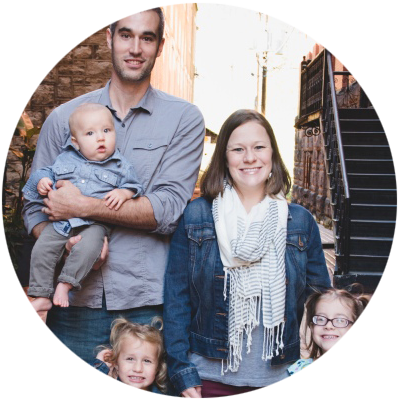Life has changed drastically over the last couple weeks. Sure, some of the normal routines continue. My kids still wake up about half an hour before I want them to, and the morning consists of making coffee and getting everyone breakfast. But there’s no rush to get out the door. School is canceled (our district has yet to start online classes), and like many others, I’m working from home (though my home “office” in the attic, doesn’t quite measure up to the home offices I see people reporting from on the evening news).
Even the food I prepare for breakfast feels different. Normally we buy two gallons of milk every three days or so for our family of six. Now I ration the milk the kids use for their breakfast cereal—a different kind of cereal than they usually eat because Walmart was out of our first two choices. (Don’t even ask me about our toilet paper supply. Let’s just say we didn’t hoard.)
The relational changes are even more glaring. Last Saturday instead of the large family birthday party we had expected, our son celebrated his fourth birthday as our family (almost all local) sang to him over Zoom. At church, we are doing the same thing. Two weeks ago our worship services and small groups transitioned almost overnight to platforms like Facebook, Zoom, and YouTube.
How Should I Lead in This Place at This Time?
It’s all a bit dizzying and, if we’re honest, more than a bit anxiety-inducing. It has all left me asking, how does one best lead, or best pastor, during times like this? I’ve also asked myself repeatedly how does the church I pastor minister intentionally in this place during this time?
As I’ve thought, prayed, and talked with many other pastors from places large and small I’ve sensed that a large part of the answer comes down to how I’m posturing my heart. Am I leaning into headlines, anxiety, and fear, or am I leaning into Christ and the calling and community he has placed in my life and the life of our church long before this pandemic?
Leaning into Christ
Though it almost feels cliché to say it, the truth is that leading well during this crisis begins at the same source as leading well during normal times—intimacy with and dependence on Christ. I get it, but actually doing it is more difficult than one might think.
I’ve heard lots of people talking about how the silver lining of this season is a slimming down of distractions. Perhaps that is true for you—and if it is, God bless you—but that hasn’t been my experience or the experience of many of the pastors and parents I’ve talked to who are navigating a complete reorientation of church life and the tech issues that come with it or simply trying to work from home while balancing childcare and the new role as primary educator for their school-aged children. (By the way, if you are out of breath at the end of that long sentence, that’s exactly how this experience feels for many of us!) If somehow one avoids being distracted and pulled from prayer by all of that, a constantly changing stream of news about new outbreaks and looming economic fallout likely keeps you looking at a screen more now than ever before.
In the midst of this, the challenge is to lean into prayerful silence, to be still, to cease, and know that God is still God. It is in the quiet that we can hear the voice of the Good Shepherd leading us through the fray. His rod can protect us. His staff can guide us. His voice calls to us. Will we—will I—lean in and listen?
Leaning into Calling
Leaning into Christ also means leaning into the calling or vocation to which Christ has called you. This seems to me to be an extremely important posture right now for both individuals and churches.
As an individual, did Christ call you into the medical field years ago? This is a time to lean into that vocation with wisdom and dependence on Christ like never before. The same goes for all kinds of callings from first responders to pastors to grocery store clerks, truckers, and assembly line workers making masks. Some of those who work in these jobs may never have thought of their job as a calling before, but now, in light of this crisis, they see that God has called them “for such a time as this.”
The same is true for churches, large and small.
What is your church called to? Of course, all churches are called to proclaim the Good News in word and deed as a signpost of the Kingdom. But what does this look like for your church in your context at this time?
As churches innovate during these socially distanced days, there is a deep need for congregations to press into their preexisting strengths. Do you have a food pantry? Now is the time to steward that calling really well, because the need is great, and it will be difficult for churches without that ministry to create one from scratch. Is your church blessed with financial stability in this crisis? Now is the time to practice over-and-above generosity. Is your church a great teaching church? Teach the gospel like your life depended on it because some lives may. Does your church excel in caring for kids? Develop online content for them or team up with other organizations in your community who are feeding and caring for kids in safe, innovative ways. Maybe your small church isn’t super tech-savvy but you excel in prayer and relational encouragement? Start a simple phone-chain to check in on folks or pass along prayer requests. The encouragement of a familiar voice is deeply needed right now, and all churches large or small can do that.
Leaning into Community
Finally, don’t go it alone. Even though we may be physically isolated right now, we can harness the power of relationships in our churches and communities to help match the calling of individuals and churches to the needs in a specific place. Like the pastor who doesn’t know a parishioner is in the hospital unless someone tells him, our churches can’t meet needs or step into their callings in new ways, unless they are connected to the community enough to know the needs of this place in this time. Now is the time to lean into the relationships with local government and business leaders as well as local hospitals, non-profit organizations, and ministerial networks. If you don’t have these connections, now is the time to reach out to make them.
By leaning into the community even as we lean into our own callings and intimacy with Christ, we can be the people and the congregations our towns and communities need right here and right now no matter how long social distancing continues.
This blog was originally published on ruralministry.org and is reposted here with permission from the author.
Taking Your Church Online
About the Author

Charlie Cotherman is administrative director of the Project on Rural Ministry at Grove City College. He is also a pastor at Oil City Vineyard, a church he and his wife Aimee had the privilege of planting in 2016. He has written about rural ministry and church planting for Christianity Today, Evangelicals, Multiply Vineyard, and Sapientia. He is a co-editor of Sent to Flourish: A Guide to Planting and Multiplying Churches and the author of To Think Christianly: A History of L’Abri, Regent College, and the Christian Study Center Movement. He lives with his wife, four children, and a cat in historic Oil City, Pennsylvania.
The views expressed on this site or in this media are those of the speaker(s), author(s), or contributor(s), and do not necessarily represent the views of Vineyard USA or any of its Regions, Ministries or Initiatives. For more information, see the
Vineyard USA disclaimer here.





